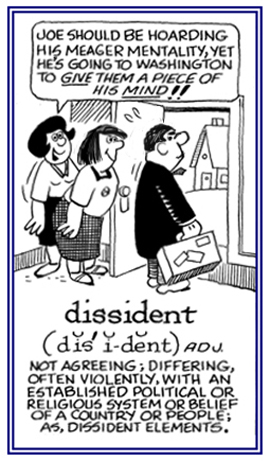You searched for:
“dissident”
diffident, dissident, dissident
diffident (DIF i duhnt, DIF i dent") (adjective)
Hesitant, lacking in self-confidence: Ethan's diffident manner suggested he was shy rather than embarrassed.
dissident (DIS i duhnt, DIS i dent) (noun)
Someone who is opposed to official policies, etc.: The dissident in congress voted against the government’s proposed legislation.
dissident (DIS i duhnt, DIS i dent) (adjective)
Relating to having a different opinion than other individuals or groups: Hana's dissident activities suggested she was having contrary opinions about the candidate for office.
The leader of the dissident faction attending the conference displayed a surprisingly diffident attitude when speaking to the crowd.
This entry is located in the following unit:
Confusing Words Clarified: Group D; Homonyms, Homophones, Homographs, Synonyms, Polysemes, etc. +
(page 4)
dissident (adjective) (not comparable)
A reference to a disagreement with others, as in opinion or belief: The dissident students objected to the teacher's sudden announcement that there would be a quiz regarding the contents of the homework that was assigned the day before.

© ALL rights are reserved.

© ALL rights are reserved.
Go to this Word A Day Revisited Index
A judge ordered that dissident Kim Davis should remain in jail for her continued refusal to either issue marriage licenses to same-sex couples or to allow her deputies to do it.
There were also three other dissident clerks in Kentucky who have refused to issue wedding licenses; despite the U.S. Supreme Court’s order legalizing same-sex matrimony.


Go to this Word A Day Revisited Index
so you can see more of Mickey Bach's cartoons.
This entry is located in the following unit:
dis-, di-, dif-
(page 27)
1. Someone who does not agree with some established policy: A dissident is often against authoritarian regimes or some established constitutional order which he or she does not agree with.
3. Etymology: From Latin dissidentem and dissidere, "to be remote, to disagree, to be removed from"; "to sit apart"; derived from dis-, "apart" + sedere, "to sit".
In totalitarian regimes, dissidents are often punished with lengthy prison terms, execution, economic deprivation, or confiscation of their property.
2. A person who is characterized by departing from accepted beliefs or standards: Political dissidents primarily use non-violent means of political disagreement, including voicing criticism of the government or a dominating ideology; but dissidents can also attempt to displace or overthrow the established government by achieving popular support and inciting a revolution or a rebellion.3. Etymology: From Latin dissidentem and dissidere, "to be remote, to disagree, to be removed from"; "to sit apart"; derived from dis-, "apart" + sedere, "to sit".
This entry is located in the following units:
dis-, di-, dif-
(page 27)
sed-, sedat-, -sid, -sess
(page 2)
Word Entries at Get Words:
“dissident”
Conveying a lack of agreement with, or being strongly against, an established organization and its beliefs or policies. (2)
This entry is located in the following unit:
Word a Day Revisited Index of Cartoons Illustrating the Meanings of Words
(page 32)
